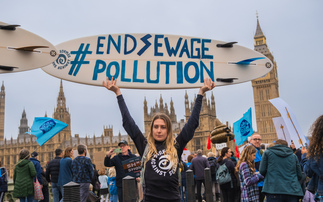EU climate chief says that aspirational 1.5C target was put into Paris climate deal at insistence of ‘most exposed countries' and will require new strategies
The EU has admitted it has not yet looked into the polices needed to hold global warming to 1.5C, as agreed at the landmark Paris agreement, and will instead ask a UN climate science panel for advice involving "negative emissions" technology.
The bloc's negotiators had gone to Paris with a mandate for a 2C target but were forced to accommodate more ambitious demands from "the most exposed countries", the bloc's climate chief, Miguel Arias Cañete, said.
Several small island states could be swallowed by rising seas if the planet warms by 2C, scientists believe.
"For sure, 1.5C is a trajectory of full decarbonisation and will require accelerated strategies and pathways," Cañete told a Brussels press conference. "About negative emissions, the IPCC [UN Intergovernmental Panel on Climate Change] will say when and how."
Because the emissions cuts pledged in Paris chart a journey to a world warmed between 2.7-3C, the only way many climate scientists can envisage saving smaller island states is with negative emissions technology that sucks carbon out of the air, in the second part of this century.
Negative emissions can refer to geoengineering but usually means the mass deployment of carbon capture and storage (CCS) technologies which bury CO2 in underground fissures. These would be fixed to power plants powered by ‘carbon neutral' bioenergy, which removes carbon from the air as it grows. More carbon would be saved than re-released into the atmosphere, the theory goes, so creating net zero emissions.
But the idea has proved controversial, with Kevin Anderson, the deputy director of the Tyndall Centre for Climate Change branding negative emissions "highly speculative" over the weekend.
"In the absence of negative emissions, staying below the 2C commitment demands levels of reductions in emissions far beyond anything discussed during the Paris negotiations," Anderson said.
Cañete said that Europe would not raise its pledge for a 40 per cent emissions cut by 2030, before a five-yearly review process flagged in the Paris agreement begins. The EU hopes this process will start ratcheting up green commitments in 2023, although the bloc is counting on an IPCC snapshot of warming trends five years before that.
"In 2018, there will be a stock take," Cañete said. "Then in 2020 we can come along with more ambition. It will be for the next commission to lead this process."
"We will need additional legislation if we have more commitment, that is for sure," the Spanish commissioner added. But developing world countries will note his reminder that when the EU set out its climate pledge, "we said that if we go further, we will be using international carbon credits."
For the moment, Cañete will be focused on new legislation to oversee the bloc's promises on CO2 reductions and clean energy progress, themselves a touchy subject with EU states such as Poland.
Cañete also fired a warning shot to the International Council on Civil Aviation (Icao) where Europe was "concerned at the slow pace of negotiations" on measures to cut airlines' emissions.
Without action in 2016, the EU would have to take a decision on reimposing carbon fees on international airlines, Cañete added. These were frozen in 2012 to allow diplomats more time to agree on alternative market-based measures.
The EU's most senior climate official declared himself more sanguine about the durability of the global climate compact in the US. "Even under a Republican administration, if India, China, Brazil stay on board, the US will not be able to stay outside the Paris agreement," he said.
"In 2018, there will be a stock take," Cañete said. "Then in 2020 we can come along with more ambition. It will be for the next commission to lead this process."
"We will need additional legislation if we have more commitment, that is for sure," the Spanish commissioner added. But developing world countries will note his reminder that when the EU set out its climate pledge, "we said that if we go further, we will be using international carbon credits."
For the moment, Cañete will be focused on new legislation to oversee the bloc's promises on CO2 reductions and clean energy progress, themselves a touchy subject with EU states such as Poland.
Cañete also fired a warning shot to the International Council on Civil Aviation (Icao) where Europe was "concerned at the slow pace of negotiations" on measures to cut airlines' emissions.
Without action in 2016, the EU would have to take a decision on reimposing carbon fees on international airlines, Cañete added. These were frozen in 2012 to allow diplomats more time to agree on alternative market-based measures.
The EU's most senior climate official declared himself more sanguine about the durability of the global climate compact in the US. "Even under a Republican administration, if India, China, Brazil stay on board, the US will not be able to stay outside the Paris agreement," he said.
This article first appeared at the Guardian
BusinessGreen is part of the Guardian Environment Network








